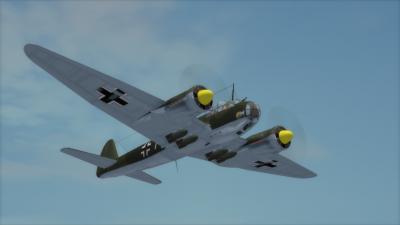Difference between revisions of "Junkers Ju 88"
| (4 intermediate revisions by the same user not shown) | |||
| Line 4: | Line 4: | ||
| colspan="2" style="text-align: center;" | [[File:Ju88.png|400px]] | | colspan="2" style="text-align: center;" | [[File:Ju88.png|400px]] | ||
|- style="background:#666600; color:#fff;" | |- style="background:#666600; color:#fff;" | ||
| colspan="2" style="text-align: center;" | '''Junkers Ju | | colspan="2" style="text-align: center;" | '''Junkers Ju 88-A4''' | ||
|- style="background:#ddb;" | |- style="background:#ddb;" | ||
| colspan="2" style="text-align: center;" | Specifications | | colspan="2" style="text-align: center;" | Specifications | ||
| Line 10: | Line 10: | ||
| '''Type''' || Medium Bomber <br> Dive Bomber | | '''Type''' || Medium Bomber <br> Dive Bomber | ||
|- style="background:#f0f0f0;" | |- style="background:#f0f0f0;" | ||
| '''Armament''' || 3x 7.92 MG81 <br> 1x 7.92 MG81Z <br> #Loadout1 4x 250 kg SC250 <br> #Loadout2 4x 250 kg SC250 & 10x 50 kg SC50 | | '''Armament''' || 3x 7.92 MG81 <br> 1x 7.92 MG81Z <br> #Loadout1 4x 250 kg SC250 <br> #Loadout2 4x 250 kg SC250 & 10x 50 kg SC50 <br> #Loadout3 28x 50 kg SC50 | ||
|- style="background: white;" | |- style="background: white;" | ||
| '''Crew''' || 4 (pilot, bombardier/front gunner, rear gunner, ventral gunner) | | '''Crew''' || 4 (pilot, bombardier/front gunner, rear gunner, ventral gunner) | ||
| Line 21: | Line 21: | ||
==History== | ==History== | ||
In October 1937 Generalluftzeugmeister Ernst Udet had ordered the development of the Ju 88 as a heavy dive bomber. This decision was influenced by the success of the Ju 87 Stuka in this role. The Junkers development at Dessau gave priority to the study of pull-out systems and dive brakes. The first prototype to be tested as a dive bomber was the Ju 88 V4 followed by the V5 and V6. These models became the planned prototype for the A-1 series. The V5 made its maiden flight on 13 April 1938, and the V6 on 28 June 1938. Both the V5 and V6 were fitted with four-blade propellers, an extra bomb bay and a central "control system".</br> As a dive bomber, the Ju 88 was capable of pinpoint deliveries of heavy loads; however, despite all the modifications, dive bombing still proved too stressful for the airframe, and in 1943, tactics were changed so that bombs were delivered from a shallower, 45° diving angle. Aircraft and bomb sights were accordingly modified and dive brakes were removed. With an advanced Stuvi dive-bombsight, accuracy remained very good for its time. Maximum bomb load of the A-4 was 3,000 kg (6,600 lb), but in practice, standard bomb load was 1,500–2,000 kg (3,300–4,400 lb). | |||
==Game Play== | ==Game Play== | ||
| Line 30: | Line 31: | ||
<br> | <br> | ||
{{Template:Air Units}} | {{Template:Air Units}} | ||
[[Category:Air]] [[Category: | |||
[[Category:Air Units]] | |||
[[Category:Bomber]] | |||
Latest revision as of 03:26, 26 November 2023
Junkers Ju 88 A4
History
In October 1937 Generalluftzeugmeister Ernst Udet had ordered the development of the Ju 88 as a heavy dive bomber. This decision was influenced by the success of the Ju 87 Stuka in this role. The Junkers development at Dessau gave priority to the study of pull-out systems and dive brakes. The first prototype to be tested as a dive bomber was the Ju 88 V4 followed by the V5 and V6. These models became the planned prototype for the A-1 series. The V5 made its maiden flight on 13 April 1938, and the V6 on 28 June 1938. Both the V5 and V6 were fitted with four-blade propellers, an extra bomb bay and a central "control system".
As a dive bomber, the Ju 88 was capable of pinpoint deliveries of heavy loads; however, despite all the modifications, dive bombing still proved too stressful for the airframe, and in 1943, tactics were changed so that bombs were delivered from a shallower, 45° diving angle. Aircraft and bomb sights were accordingly modified and dive brakes were removed. With an advanced Stuvi dive-bombsight, accuracy remained very good for its time. Maximum bomb load of the A-4 was 3,000 kg (6,600 lb), but in practice, standard bomb load was 1,500–2,000 kg (3,300–4,400 lb).
Game Play
For an in-depth guide to divebombing, have a look at the CAS section
| Air Units in Battleground Europe | |
|---|---|
| Fighters and fighter bombers | |
| Bf 109E-1 | Bf 109E-4| Bf 109E-4B |Bf 109F-2 | Bf 109F-4 | Bf 109G-2/R1| Bf 109G-6/U4 | Bf 110C-4 | Bf 110C-4/B | Blenheim IF | Dewoitine D.520 | Fw 190A-3B | Fw 190A-4 | Hawk 75 | Hawk 81 | Hawk 87 | P-40F Kittyhawk Fighter Bomber | | Hurricane Mk I | Hurricane Mk IIb | Hurricane Mk IIc | Hurricane Mk IID | Junkers 87G2 'Stuka' | P-38 'Lightning' | Bell Model 14a / P-400 Airacobra | Model 26 / P-39N Airacobra | Spitfire Mk Ia | Spitfire Mk IIb | Spitfire Mk Vb | Spitfire Mk IXc | |
| Bombers | |
| Blenheim IV | Douglas DB-7 | Havoc Mk.I | A20C Havoc | Heinkel 111 | Junkers Ju 88A4 | Junkers 87 'Stuka' | | |
| Transport | |
| C47 'Skytrain' | Junkers 52 | |
